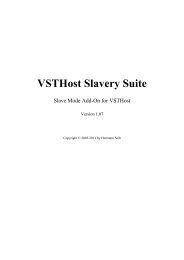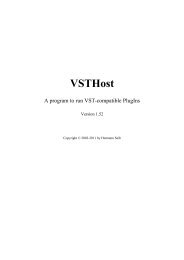Plugin Consultant Guide
Plugin Consultant Guide
Plugin Consultant Guide
You also want an ePaper? Increase the reach of your titles
YUMPU automatically turns print PDFs into web optimized ePapers that Google loves.
<strong>Plugin</strong> Scan<br />
Some hosts, such as Cubase, perform a plugin scan of the VST folder, usually when they<br />
start, and call the main() function of every plugin. If <strong>Plugin</strong> <strong>Consultant</strong> is located in the<br />
VST folder then it will ask for the VST plugin to log. You should select the same plugin that<br />
you are going to log later in the actual session since the host might store information<br />
about this plugin and this information should match the plugin that will be logged in the<br />
session. You can also see using <strong>Plugin</strong> <strong>Consultant</strong> log what the host actually does with the<br />
plugin in the plugin scan process. Some hosts will cache the scan information and will not<br />
load <strong>Plugin</strong> <strong>Consultant</strong> each time they start. In this case you will need to tell the host to<br />
re-scan the plugin folder before starting to log a new plugin.<br />
If you are using Cakewalk VST Adapter then the plugin scan happens when the adapter<br />
scans your VST plugins and not when a Cakewalk host starts. This mean that before a log<br />
session of a new plugin, you need to let the adapter scan <strong>Plugin</strong> <strong>Consultant</strong>, select the<br />
plugin to log, and only then run the Cakewalk host and use <strong>Plugin</strong> <strong>Consultant</strong> to log the<br />
same plugin you selected in the scan process.<br />
Selecting a <strong>Plugin</strong><br />
When you want to log a plugin you will need to load <strong>Plugin</strong> <strong>Consultant</strong> in your host. <strong>Plugin</strong><br />
<strong>Consultant</strong> looks to the host as the VST you selected when the host loaded <strong>Plugin</strong><br />
<strong>Consultant</strong> in the plugin scan. For example, in Cubase, if you selected an effect in the<br />
plugin scan then <strong>Plugin</strong> <strong>Consultant</strong> will appear in Cubase as an effect. If you selected an<br />
instrument in the plugin scan then <strong>Plugin</strong> <strong>Consultant</strong> will appear in Cubase as an<br />
instrument.<br />
Some hosts do not do a plugin scan and do not call main() function of the DLLs in the<br />
plugin folder. In these hosts the plugins will not be identified as effects or instruments<br />
since the main() function needs to be called in order to get this information. In other hosts<br />
you can even load a plugin by providing a DLL file name or by dropping the plugin DLL file<br />
on the host. With these hosts you can just select to load <strong>Plugin</strong> <strong>Consultant</strong> or<br />
<strong>Plugin</strong><strong>Consultant</strong>.DLL file.<br />
Once <strong>Plugin</strong> <strong>Consultant</strong> is loaded by the host it will ask you to choose a VST plugin DLL file<br />
to log. After you select a VST plugin the logged plugin will load as usual (although its name<br />
will appear as <strong>Plugin</strong><strong>Consultant</strong>) and you can use it and use its GUI (if it has one). In<br />
addition the <strong>Plugin</strong> <strong>Consultant</strong> window will appear as a different application in the Windows





